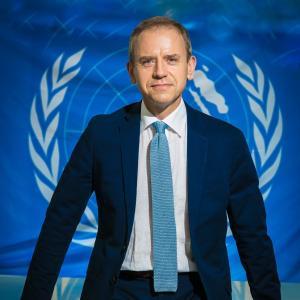Speech by UN Resident Coordinator Dr. Stephen Jackson at the World AIDS Day in Nakuru County
UN Resident Coordinator Dr. Stephen Jackson speech during the 2021 World AIDS Day, where President Uhuru Kenyatta was also in attendance
The Global theme for World AIDS day is “End inequalities. End AIDS.”
Kenya has selected the theme “End Teenage Pregnancy towards eliminating inequalities and new HIV infections.
#Komesha Mimba za Utotoni
• Your Excellency, President Uhuru Kenyatta
• Your Excellency, Governor Lee Kinyanjui of Nakuru
• Your Excellency, Cabinet Secretary for Health, Mutahi Kagwe
• My sister, Dr. Medhin Tsehaiu, Country Director for UNAIDS
• Excellencies, friends
World AIDS Day is a time to take stock of successes and challenges in tackling the HIV/AIDS epidemic.
New HIV cases in Kenya have declined remarkably - from a high of 230,000 new infections in 1992 to some 40,000 today – a six-fold reduction.
Global and Kenyan responses have reduced deaths and new infections in ways once thought impossible.
But this is also a solemn day:
We remember those we have lost.
We recognize that vast numbers of people are still becoming infected.
And we cannot accept that many still dying from the virus because they cannot get the life-saving treatment that is their right.
New HIV infections are not falling fast enough globally to stop the pandemic.
There were 1.5 million new HIV infections around the world in 2020.
And HIV infection rates are actually growing in some countries.
And, Excellencies, friends
– New infections are increasingly concentrated in deep inequality.
That is what drives our global theme today: end inequalities to end AIDS
Your Excellency the President –
In New York in October, presiding over the Security Council, you spoke movingly of the relationship between inequality, cohesion and conflict.
With full respect, may I quote you?
“Exclusion is often institutionalized in governance and economic relations at the national and global level. It manifests in stereotyping and bigotry.”
You went on to note that to prevent social conflict
“We also need to change how we embrace diversity at the national and local level.”
I profoundly agree. Ending HIV/AIDS is another war that requires us to defeat the root causes:
inequalities and exclusion.
Otherwise put, Kenya’s remarkable success in reducing HIV/AIDS cannot be completed until we move beyond stigma to reaching the hardest to reach populations
Some examples:
Six in seven new HIV infections among adolescents in sub-Saharan Africa occur among adolescent girls.
Last year, a UNICEF/Homa Bay County Government study showed how gender inequality, difficulties in accessing services and poverty together drive teenage pregnancy and new HIV cases in mothers and infants.
I need hardly add that teenage pregnancy has risen during the COVID Pandemic.
Meanwhile, gay men and men who have sex with men, sex workers and people who use drugs face a 25–35 times greater risk of acquiring HIV worldwide.
Excellencies – As the United Nations Secretary General, António Guterres, says in his message for World AIDS Day:
“To beat AIDS – and build resilience against the pandemics of tomorrow – we need collective action.
That includes harnessing the leadership of communities to drive change, combatting stigma, and eliminating discriminatory and punitive laws, policies and practices.”
Let me salute you, Mr. President, for leading the fight against gender exclusion in Kenya: Against GBV, against FGM and for equal participation by women and girls.
And by your presence today,
Excellencies, all of you symbolize – across the sectors – the collective determination to combat inequality and beat AIDS in Kenya. UN Kenya is also resolutely determined.
“Leaving No One Behind” will be the anchor principle of our new Cooperation Framework.
And accompanied by the Deputy Secretary-General I had the honour to present to you,
Mr. President, the LNOB Analysis for Kenya that underpins it.
The new Global AIDS strategy (2021-2026) and the 2021 UN Political Declaration on HIV, adopted by member states including Kenya, affirm the same determination to end inequalities and end AIDS by 2030, together.
The targets for 2025 are:
a) achieving equitable access to services and solutions towards 95:95:95
That means by 2030: 95% diagnosis among all people living with HIV, 95% on antiretroviral therapy among diagnosed, and 95% virally suppressed among those being treated.
AND
b) breaking down structural barriers for 10:10:10
That means removing less than 10% of countries will have punitive laws or policies;
fewer than 10% will experience stigma and discrimination; and less than 10% of vulnerable populations experience gender inequality or violence.
AND
c) full funding and effective responses to end AIDS by 2030
These are “last mile challenges” because HIV is increasingly concentrated in pockets of stigma, marginalization and exclusion. They require scale and determination
They will oblige us to stretch our available resources to ensure efficiency, affordability, and sustainability. And they require innovation to reach and serve hard-to-reach populations: adolescents and young people, teenage girls at risk of pregnancy, people living with disabilities, and LGBTQI communities. Mr. President – Together we can end inequality and so end HIV/AIDS. Your Government is committed. Your fight to end HIV/AIDS is resolute and also forms part of your larger determination to end inequalities and promote societal cohesion. Your partners are committed. And on this World AIDS Day, let me close by reaffirming that the UN – in Kenya and around the world – is committed. Komesha Mimba za Utotoni! Tuendelee pamoja! Thank you
Speech by





